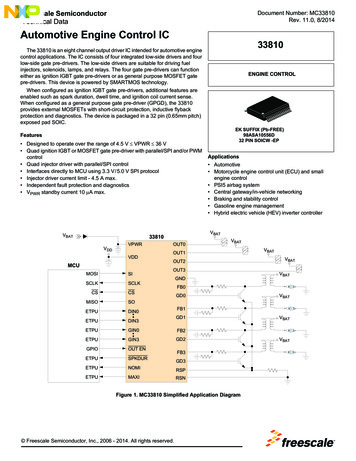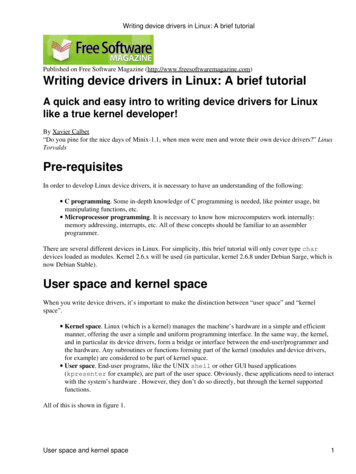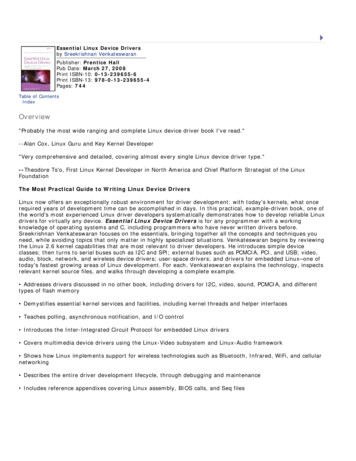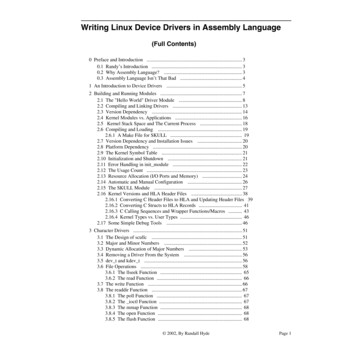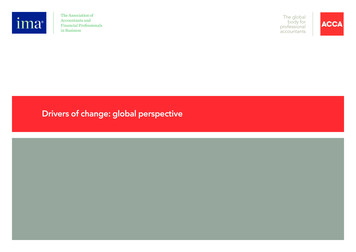
Transcription
Drivers of change: global perspective
ACCADRIVERS OF CHANGE: GLOBAL PERSPECTIVEINTRODUCTIONIntroductionThis report outlines the main findings of a survey recentlyconducted by ACCA and IMA across their membership on 100drivers of change for the global accountancy profession. It presentsthe three critical drivers of change in the short, the medium and thelong term for a variety of businesses. By identifying and exploringemerging trends, it can help accountants and business leadersprepare for an uncertain tomorrow.CONTENTSAbout the survey3Key findings: drivers and their impact4Key findings: short term5This report goes further than simply identifying critical driversacross various time frames: it explores the extent of their impactaccording to a firm’s size, location and activity.Analysis: by region and country6Analysis: by size and sector7Analysis: by role of respondents9What is most telling from the analysis is that global accountants andsenior executives share similar lines of thought. For instance, bothaccountants and senior executives emphasise the need for greateruse of non-financial and integrated reports and the need foraccountants to have a more strategic role. Both believe thataccountants are essential for businesses to succeed in an uncertainand volatile environment that is expected to persist throughout thenext decade and beyond.Key findings: medium termThis research draws on inputs from over 2,500 ACCA and IMAmembers to form the basis on how the profession can be betterpositioned to respond to the changing needs of business.10Analysis: by region and country11Analysis: by size and sector12Analysis: by role of respondents13Key findings: long term14Analysis: by region and country15Analysis: by size and sector16Analysis: by role of respondents18Drivers and how they relate to each other19Five imperatives for the accountancy profession 20www.accaglobal.com/futuresFive imperatives for business21Methodology222
ACCADRIVERS OF CHANGE: GLOBAL PERSPECTIVEABOUT THE SURVEYAbout the surveyIn 2012, ACCA and IMA conducted a global surveyto identify future drivers of change that will affectbusinesses and the global accountancy professionacross three time frames: the short term (up to threeyears into the future), the medium term (4–9 years)and the long term (10 years).Over 2,500 professional accountants and businessleaders took part in the survey, representing thedifferent sectors of the global economy.Respondents were asked to rate each driver on ascale of 1 to 7, where 1 indicates no impact and 7indicates that a significant impact is expected.The mean scores for each driver are reported here.www.accaglobal.com/futuresFURTHER READINGOther reports related to ACCA’s global Drivers of Change survey are also available: Drivers of Change in the UK (ACCA and IMA, February 2013) Drivers of Change in the US (ACCA and IMA, February 2013) Drivers of Change in Asia-Pacific (ACCA and IMA, February 2013) 100 Drivers of Change for the Global Accountancy Profession(ACCA and IMA, September 2012)www.accaglobal.com/futures3
ACCADRIVERS OF CHANGE: GLOBAL PERSPECTIVEKEY FINDINGS: DRIVERS AND THEIR IMPACTKey findings: drivers and their impactSHORTTERMENVIRONMENT – Increased fuel and energy pricesLONGTERMAccountants will in future be expected to play a fargreater role in everything from strategic decisionmaking to the design of new revenue models whilemaintaining a balance between financialstewardship and entrepreneurism in a globaleconomy where businesses are operating in avolatile, uncertain and competitive environment.TOP THREE DRIVERS IN THE SHORT, MEDIUM AND LONG TERMMEDIUMTERMIn the immediate future, businesses and theaccountancy profession are most concerned, by far,with rises in fuel and energy prices. Nonetheless,in the more distant future, trends related directly tothe profession, the economy or politics play agreater role.5.36SCIENCE AND TECHNOLOGY – Cyber security challenges for business5.04BUSINESS – The potential strengthening of corporate governanceregulation and practice globally4.85ACCOUNTANCY – A requirement for businesses to provide increased non-financialinformation and the continued emergence of integrated reporting models5.13ACCOUNTANCY – Increased focus on the accountant’s role as businesspartner and the broader skill sets required5.10ACCOUNTANCY – Greater harmonisation of global accountingand business standards5.03ECONOMY – Changes in the global reserve currencyfrom the US dollar to a different currency4.83POLITICS – A change in the focus of global governance institutions4.68ECONOMY – In an electronic world, a radical alteration of the systemof using money as the basis of a system of exchange4.680www.accaglobal.com/futures12 3 4 5 6Mean score74
ACCADRIVERS OF CHANGE: GLOBAL PERSPECTIVEKEY FINDINGS: SHORT TERMKey findings: short term‘High cost of fuel andenergy reducing overallbusiness profits’TOP THREE DRIVERS (SHORT TERM)SHORTTERMGlobally, the rise in energy and fuel prices will bethe most pressing issue facing businesses and theprofession until 2015. The price rise in fuel andenergy has a twofold effect with an almostimmediate impact: it increases businesses’operating costs and decreases consumer spending.5.36ENVIRONMENT – Increased fuel and energy pricesSCIENCE AND TECHNOLOGY – Cyber security challenges for business5.04BUSINESS – The potential strengthening of corporate governanceregulation and practice globally4.850‘Operating costs drivenby energy scarcity’12 3 4 5 6Mean score7The second critical short-term driver identified isthe cyber security challenge posed by an array ofthreats. As the world has become more reliant oncomputers and the continued digitisation offinancial services, this has exposed individuals andorganisations to threats from cyberspace; newforms of cyberterrorism, cybercrime and cyberfraudwill continue to emerge.The third critical driver that is expected to play arole in the immediate future is the evolution andstrengthening of global corporate governanceregulation and practice, a reflection of how businessesare now operating in a truly global environment.www.accaglobal.com/futures5
ACCADRIVERS OF CHANGE: GLOBAL PERSPECTIVEKEY FINDINGS: SHORT TERMAnalysis: by region and countryThe increase in energy and fuel prices was thedriver of most concern identified by respondentsbased in the UK and US (a mean score of 5.49 and5.43 respectively) while those based in Asia-Pacificwere the least concerned (5.16).Similar patterns were reported on cyber securitychallenges; American respondents were by far themost concerned (5.36, second critical driver) andthose based in Asia-Pacific were the least (4.80).www.accaglobal.com/futuresWhile the strengthening of global corporategovernance regulations and practices has in generalbeen identified as the third most important driver,respondents based in Europe and Asia-Pacificidentified the ease and continued spread of internetaccess as the third most important driver. Thespread of publicly available Wi-Fi also means thatcontinuous connectivity is becoming a reality.Internet black spots are becoming fewer and furtherapart and where no internet connectivity can befound Wi-Fi is quickly becoming a suitable andreliable alternative.6
ACCADRIVERS OF CHANGE: GLOBAL PERSPECTIVEKEY FINDINGS: SHORT TERMAnalysis: by size and sectorAccountancy firms, the big ones in particular, havehighlighted the skills and the capacity of theprofession in transitional and high-growtheconomies as the second most important driver inthe immediate future. On the other hand, financialservices businesses are most concerned with theincrease in complexity of both legal regulation andthe business environment itself.www.accaglobal.com/futuresENVIRONMENT –Increased fuel and energy pricesSHORTTERMLarge organisations ( 250 employees) placed ‘thepotential strengthening of corporate governanceregulation and practice globally’ in third place intheir list of concerns while SMEs gave moreimportance to the ‘ease of internet access for thegeneral population’. To some extent, this reflectsthe environment in which businesses of differentsizes operate: whether they have global reach or aremore immediately concerned with local issues.TOP THREE DRIVERS: ACCOUNTANCY PRACTICES5.05Big Four4.73ACCOUNTANCY –Accounting skills and capacity intransitional and high-growth economiesSCIENCE AND TECHNOLOGY –Ease of internet access for thegeneral populationSCIENCE AND TECHNOLOGY –Cyber security challengesfor 1234Mean score56767TOP THREE DRIVERS: CORPORATE SECTORSHORTTERMThe rise in energy and fuel prices and the cybersecurity challenge were the concerns most reportedby companies irrespective of their size. It is nosurprise, however, that small and medium-sizedenterprises (SMEs) reported higher levels ofconcern for rising fuel prices and energy costs asthey represent a heavier burden for them than forlarger organisations.ENVIRONMENT –Increased fuel and energy pricesSCIENCE AND TECHNOLOGY –Cyber security challengesfor businessSCIENCE AND TECHNOLOGY –Ease of internet access for thegeneral populationLargeorganisation( 250employees)5.305.014.855.52SME(0 to 249employees)5.044.7201234Mean score57
ACCADRIVERS OF CHANGE: GLOBAL PERSPECTIVEKEY FINDINGS: SHORT TERMLargeorganisation( 250employees)SME(0 to 249employees)SHORTTERMTOP THREE DRIVERS: FINANCIAL SERVICESBUSINESS – The potential strengthening of corporategovernance regulation and practice globally5.52LEGAL – A further increase in the volumeand complexity of legal regulation5.29BUSINESS – Continued increase in the levelof complexity of businesses5.20BUSINESS – The potential strengthening of corporategovernance regulation and practice globally5.24ENVIRONMENT – Increased fuel and energy prices5.24SCIENCE AND TECHNOLOGY – Cyber securitychallenges for business5.1601234Mean score56767SHORTTERMTOP THREE DRIVERS: PUBLIC SECTOR AND NOT-FOR-PROFITENVIRONMENT –Increased fuel and energy prices5.41Public sector5.255.04SCIENCE AND TECHNOLOGY –Cyber security challenges for businessBUSINESS –The potential strengthening of corporategovernance regulation and practice globallySCIENCE AND TECHNOLOGY –Ease of internet access for the general l.com/futures1234Mean score58
ACCADRIVERS OF CHANGE: GLOBAL PERSPECTIVEKEY FINDINGS: SHORT TERMAnalysis: by role of respondentsINCREASE IN FUEL AND ENERGY PRICESA FURTHER INCREASE IN THE VOLUME ANDCOMPLEXITY OF LEGAL REGULATIONCITED BYCITED BY3 out of 4senior executives, accountantsand internal auditorsCYBER SECURITY CHALLENGESsenior executives:internal auditors:THE POTENTIAL STRENGTHENING OF CORPORATEGOVERNANCE REGULATION AND PRACTICE GLOBALLYCITED BYCITED BY OVER2 out of 3senior executives and accountantswww.accaglobal.com/futures64%74%60%of accountants and managers9
ACCADRIVERS OF CHANGE: GLOBAL PERSPECTIVEKEY FINDINGS: MEDIUM TERMKey findings: medium termThe most significant driver that is expected to havethe most impact in the medium term (2016 to 2022)is the requirement for businesses to provideincreased non-financial information and thecontinued emergence of integrated reportingmodels. Non-financial information is increasinglyrecognised as being as important as financialinformation in affecting business value and risk.In response to demands for a holistic picture oforganisational health, models of integratedreporting are also being increasingly adopted.The need for the profession to broaden its scopeand to take on a more strategic role, by becomingan important and integral business partner, was thesecond most critical driver identified.www.accaglobal.com/futuresTOP THREE DRIVERS (MEDIUM TERM, 4–10 YEARS)MEDIUMTERMThe global economy is underpinned by a complexinfrastructure that allows it to function. In thisinfrastructure, the accountancy profession plays alarge role.ACCOUNTANCY – A requirement for businesses to provide increased non-financialinformation and the continued emergence of integrated reporting models5.13ACCOUNTANCY – Increased focus on the accountant’s role as businesspartner and the broader skill sets required5.10ACCOUNTANCY – Greater harmonisation of global accountingand business standards5.030‘Change the way accounting isviewed. Accountants becominga more integral part of thedecision-making process’12 3 4 5 6Mean score7As businesses globalise beyond traditionalboundaries and more economies open up andadapt to global practices and norms, the need forglobal regulation increases. Greater harmonisationof global accounting and business standards wasreckoned third in order of importance.10
ACCADRIVERS OF CHANGE: GLOBAL PERSPECTIVEKEY FINDINGS: MEDIUM TERMAnalysis: by region and countryOn the other hand, US-based respondents placedmore emphasis on the shift in demographics, thechanging balance in the workforce and theincreasing welfare needs of an older society, thesebeing their main drivers in the medium term.TOP THREE DRIVERS: CORPORATE SECTOR UK VS GLOBAL5.08MEDIUMTERMThe increased need for non-financial informationand the continued emergence of integratedreporting models were the main drivers cited byEuropean (excluding UK) and Middle-Easternrespondents. They were also the most concernedwith the move towards greater harmonisation ofglobal accounting and business standards.ACCOUNTANCY – Increased focus on theaccountant’s role as business partner andthe broader skill sets requiredUK5.034.99ACCOUNTANCY – A requirement for businesses toprovide increased non-financial information and thecontinued emergence of integrated reporting modelsECONOMY – The impact of businessesfrom BRIC economies5.10Global5.154.9901234Mean score567The second critical global driver, the closer focus onthe accountant’s role as business partner, toppedthe list for UK and Asia-Pacific respondents. Theincreasing importance of and pressures from BRICeconomies (Brazil, Russia, India and China), as theybecome significant markets and sources of futurecompetition, was cited as the second mostimportant driver for respondents based in the UKand Asia-Pacific.www.accaglobal.com/futures11
ACCADRIVERS OF CHANGE: GLOBAL PERSPECTIVEKEY FINDINGS: MEDIUM TERMAnalysis: by size and sectorIn general, SMEs, irrespective of the sector in whichthey operate, reported ‘greater harmonisation ofglobal accounting and business standards’ as themain driver that will have the greatest impact in themedium term. The increased focus on theaccountant’s role as a business partner and thebroader skill sets required were identified as thethird critical ium and large organisations regarded theincreasing role of non-financial information and theevolution of integrated reporting models as theirmain drivers of change. This was followed by thechanging role of accountants and their expandingremit, which will encompass a new range of evolvingdemands and services. The new demands onaccountants might involve greater input intocorporate strategy, mergers and acquisition deals,and interaction with the media and policymakers. Inaddition to this, accountants may be expected todisplay greater responsibility in risk managementand ensuring that strategic decisions bring aboutsustainable value.TOP THREE DRIVERS: ACCOUNTANCY PRACTICESACCOUNTANCY – A requirement for businesses toprovide increased non-financial information and thecontinued emergence of integrated reporting modelsBig Four5.345.16ACCOUNTANCY – Greater harmonisation ofglobal accounting and business standardsACCOUNTANCY – Increased focus on theaccountant’s role as business partner andthe broader skill sets Mean score56767TOP THREE DRIVERS: PUBLIC SECTOR AND NOT-FOR-PROFITMEDIUMTERMIrrespective of their size, organisations reported thesame three drivers as the most important in themedium term.ACCOUNTANCY – A requirement forbusinesses to provide increased nonfinancial information and the continuedemergence of integrated reporting models5.10Public sector5.125.11ACCOUNTANCY – Increased focus on theaccountant’s role as business partnerand the broader skill sets requiredACCOUNTANCY – Greater harmonisation ofglobal accounting and business standardsSOCIETY – The changing age balance to theworkforce and the increasing welfare needsof senior society5.375.36Not-for-profit5.1801234Mean score512
ACCADRIVERS OF CHANGE: GLOBAL PERSPECTIVEKEY FINDINGS: MEDIUM TERMAnalysis: by role of respondentsA REQUIREMENT FORBUSINESSES TO PROVIDEINCREASED NON-FINANCIALINFORMATION AND THECONTINUED EMERGENCE OFINTEGRATED REPORTING MODELSINCREASED FOCUS ON THE ACCOUNTANT’S ROLE AS BUSINESSPARTNER AND THE BROADER SKILL SETS REQUIREDCITED BYCITED BY5 out of 7senior executives3 out of 4accountantsGREATER HARMONISATION OF GLOBAL ACCOUNTING ANDBUSINESS STANDARDSCITED BY5 out of 7senior executiveswww.accaglobal.com/futures2 out of 3senior executives5 out of 7accountants13
ACCADRIVERS OF CHANGE: GLOBAL PERSPECTIVEKEY FINDINGS: LONG TERMKey findings: long termThe focus of global governance institutions has alsobeen cited as one of the top three long-termdrivers. Institutions such as the World Bank, IMF andUN are faced with greater pressures to respond toglobal changes from emerging nations that arebecoming more influential. At the same time, thereis an increase in the number of institutionsoperating on a regional level (for example: theAssociation of Southeast Asian Nations (ASEAN)and the Gulf Cooperation Council).www.accaglobal.com/futuresTOP THREE DRIVERS (LONG TERM, 10 YEARS)LONGTERMThe main drivers expected to have the greatestimpact on businesses and the accountancyprofession from 2023 onwards are concerned withchanges in the current roles of currencies, wherethe position of the US dollar, as the global reservecurrency and the commonly accepted store of valueand means of exchange, is being questioned. Anexample of the challengers is Bitcoin, a purelypeer-to-peer digital currency that is traded onlinewithout going through a financial institution.ECONOMY – Changes in the global reserve currencyfrom the US dollar to a different currency4.83POLITICS – A change in the focus of global governance institutions4.68ECONOMY – In an electronic world, a radical alteration of the systemof using money as the basis of a system of exchange4.68012 3 4 5 6Mean score714
ACCADRIVERS OF CHANGE: GLOBAL PERSPECTIVEKEY FINDINGS: LONG TERMAnalysis: by region and countryAcross most regions, the ‘changes in the globalreserve currency from the US dollar to a differentcurrency (eg the EUR and CNY)’ topped the list asthe strongest driver. Respondents from the US andAsia-Pacific gave this the highest rating (and those inthe Middle East, the lowest). In the aftermath ofglobal financial turbulence and continued economicuncertainty in the US, the role of the US dollar as theglobal reserve currency is being increasinglyquestioned. The shift in global financial power to theEast is already being reflected in the rise of dim sumbonds (bonds denominated in Chinese yuan, issuedin Hong Kong) and the broadening range of globalcurrencies being held by countries around the world.www.accaglobal.com/futuresBritish and European respondents were the onlyones who rated ‘a change in the focus of globalgovernance institutions – via either increasinginfluence wielded by emerging global powers, or anincrease in the number and influence of regionalinstitutions’ to be the second most important driver.The changing societal expectations and theevolving scope and nature of what is considered tofall within the remit of accountancy and the role ofthe accountant were identified as important driversby respondents from the Middle East and AsiaPacific (rated first and third respectively).The second critical driver in the next decade andbeyond for respondents from the US and AsiaPacific was the potential radical change away fromconventional money as the basis for a system ofexchange in response to a more electronic economy.15
ACCADRIVERS OF CHANGE: GLOBAL PERSPECTIVEKEY FINDINGS: LONG TERMAnalysis: by size and sectorOn the other hand, large organisations reportedthat the change in the focus of global governanceinstitutions was the second most important driver,followed by the potential change away fromconventional money as the basis for a systemof exchange.TOP THREE DRIVERS: ACCOUNTANCY PRACTICEPOLITICS - A change in the focus of globalgovernance institutionsLONGTERMFor SMEs the second driver was the radical changeaway from conventional money as the basis for asystem of exchange to other systems. Changingsocietal expectations and the evolving scope andnature of what accountancy is considered to be,together with the role of the accountant, were thethird most important driver.ACCOUNTANCY – Changing societal expectationsand the evolving scope and nature of what isconsidered accounting and the role of the accountantECONOMY – In an electronic world, a radicalalteration of the system of using money as thebasis for a system of exchangeENVIRONMENT – The significantly increaseduse of carbon taxes and other environmentalmarket mechanisms4.72Big 1234Mean score567567TOP THREE DRIVERS: CORPORATE SECTORLONGTERMECONOMY – Changes in the global reservecurrency from the US dollar to a different currencyPOLITICS - A change in the focus of globalgovernance institutionsECONOMY – In an electronic world, a radicalalteration of the system of using money as thebasis for a system of exchangeACCOUNTANCY – Changing societal expectationsand the evolving scope and nature of what isconsidered accounting and the role of the accountantLargeorganisation( 250employees)4.904.694.684.85SME(0 to 34Mean score16
ACCADRIVERS OF CHANGE: GLOBAL PERSPECTIVEKEY FINDINGS: LONG TERMTOP THREE DRIVERS: FINANCIAL SERVICESLONGTERMECONOMY – Changes in the global reservecurrency from the US dollar to a different currencyPOLITICS – A change in the focus of globalgovernance institutionsECONOMY – In an electronic world, a radicalalteration of the system of using money as thebasis for a system of exchangeENVIRONMENT – The significantly increaseduse of carbon taxes and other environmentalmarket mechanismsLargeorganisation( 250employees)4.944.984.924.87SME(0 to 249employees)4.804.8201234Mean score567567Public sctorNot-for-profitLONGTERMTOP THREE DRIVERS: PUBLIC SECTOR AND NOT-FOR-PROFITPOLITICS – A change in the focus of global governance institutions4.86ECONOMY – In an electronic world, a radical alteration of the systemof using money as the basis for a system of exchange4.72ACCOUNTANCY – Changing societal expectations and the evolving scopeand nature of what is considered accounting and the role of the accountant4.69ECONOMY – Changes in the global reserve currencyfrom the US dollar to a different currency4.74ECONOMY – In an electronic world, a radical alteration of the systemof using money as the basis for a system of exchange4.62ENVIRONMENT – The significantly increased use of carbon taxesand other environmental market mechanisms4.600www.accaglobal.com/futures1234Mean score17
ACCADRIVERS OF CHANGE: GLOBAL PERSPECTIVEKEY FINDINGS: LONG TERMAnalysis: by role of respondentsCHANGES IN THE GLOBAL RESERVE CURRENCY FROM THE US DOLLARTO A DIFFERENT CURRENCY (EG THE EURO OR YUAN)CITED BYsenior executives:60%accountants:65%A CHANGE IN THE FOCUS OF GLOBAL GOVERNANCE INSTITUTIONS –VIA EITHER INCREASING INFLUENCE WIELDED BY EMERGING GLOBALPOWERS, OR AN INCREASE IN THE NUMBER OF REGIONAL INSTITUTIONSCITED BYA POTENTIAL RADICAL CHANGEAWAY FROM CONVENTIONALMONEY AS THE BASIS FOR ASYSTEM OF EXCHANGECITED BY54%accountants andsenior managers56%senior executives and accountantswww.accaglobal.com/futures18
ACCADRIVERS OF CHANGE: GLOBAL PERSPECTIVEDRIVERS AND HOW THEY RELATE TO EACH OTHERDrivers and how they relate to each otherThis section of the report considers the relationshipbetween the short-term and long-term drivers.There are two areas where correlations existbetween what respondents believe are key shortand long-term drivers of change. Perceptions of thechanging societal expectations of accountancy andof accountants themselves correlate with a numberof other drivers, as do concerns about increasedfuel and energy prices.Those who responded that the prices of fuel andenergy are a significant driver in the immediatefuture also tended to rate the increase in carbontaxes and environmental mechanisms as a majordriver of change in the next decade and beyond.The other area where a strong relationship has beenfound between a long-term driver and a series ofshort-term drivers is the changing societalexpectations and the evolving scope and nature ofwhat accountancy is considered to be, togetherwith the role of the accountant. The diagramopposite illustrates the degree of their relationship;the strength of the relationship is indicated by theintensity of the line.www.accaglobal.com/futuresTHE FUTURE DEVELOPMENT OF THE ACCOUNTANCY PROFESSIONPublic perception on the value of the accountancyprofession and its attractiveness to future accountantsEvolving scopeand nature ofaccountancyand the role ofthe accountantAccountancy skills and capacity in transitional andhigh-growth economiesThe ability of accountancy training to be flexible,suitable, and at an affordable costContinued increase in the level of complexityof businessesThe potential strengthening of corporate governanceregulation and practice globallySTRENGTH OF RELATIONSHIP BETWEEN LONG- AND SHORT-TERM DRIVERS OF CHANGE19
ACCADRIVERS OF CHANGE: GLOBAL PERSPECTIVEFIVE IMPERATIVES FOR THE ACCOUNTANCY PROFESSIONFive imperatives for the accountancy profession12345EMBRACE AN ENLARGED STRATEGIC AND COMMERCIAL ROLEOpportunities are emerging for accountants to assume a far greater organisational remit. The potential exists toleverage the capabilities of the accountant across all aspects of corporate decision making from strategyformulation through to defining new business models.ESTABLISH TRUST AND ETHICAL LEADERSHIPThe profession needs to be seen to be addressing clear public concerns. There is a perception that it could domore to highlight and prevent everything from small-scale financial irregularities through to the major systemicfailures that helped cause the global financial crisis and ensuing economic uncertainty.FOCUS ON A HOLISTIC VIEW OF COMPLEXITY, RISK AND PERFORMANCEThere is growing consensus on the need for reporting to provide a holistic perspective of a business and thatthis perspective must acknowledge the complexity of modern business and encompass financial and nonfinancial indicators of a firm’s financial status and potential.DEVELOP A GLOBAL ORIENTATIONThe pace of global expansion of firms from developed and developing markets alike is emphasising the needfor accounting and finance professionals to master the technical, language and cultural challenges of crossborder operations.REINVENT THE TALENT POOLThe diverse range of demands and impacts on the profession is forcing a rethink of everything from trainingand development through to the type of people being recruited.www.accaglobal.com/futures20
ACCADRIVERS OF CHANGE: GLOBAL PERSPECTIVEFIVE IMPERATIVES FOR BUSINESSFive imperatives for business12345ASSUME AND PLAN FOR VOLATILITYWith uncertainty as the new normal, businesses have to factor in turbulence as a very real possibility anddevelop strategies for a range of different economic and market scenarios.BUILD THE RADARSystematic, organisation-wide approaches are required for scanning the future external environment.Preparing for a wide range of possibilities, tolerance of uncertainty, curiosity and ‘seeing round corners’ arebecoming critical development priorities for managers and leaders alike.PURSUE TECHNOLOGY LEADERSHIPThe pace and disruptive potential of information and communications technology (ICT) development hasplaced technology at the heart of strategy and operations of businesses of almost every size. New mindsetsand approaches to technology management are required to exploit and extract full value from the nextdecade of advances.PREPARE FOR TRUE GLOBALISATIONDevelopment of a truly global operating model is becoming a priority. A clear emphasis is required onleveraging technology effectively. Equally important is developing the capability of management to work with,adapt to and get the best out of a multi-location, multi-cultural and age-diverse workforce.DEVELOP A CURIOUS, EXPERIMENTAL AND ADAPTABLE MINDSETA critical success factor in an increasingly complex and fast-changing environment is building a ‘curious’culture. This implies nurturing an environment that is open to external ideas and in which participants areencouraged to forge a network of strong working relationships across the entire business ecosystem.www.accaglobal.com/futures21
ACCADRIVERS OF CHANGE: GLOBAL PERSPECTIVEMETHODOLOGYMethodologyThis report presents mean scores because they helpto provide one single result for a scale question thatis representative of all the scores assigned by all therespondents, which is calculated by giving anaverage of those scores. This helps to give a quickunderstanding of the general opinion across awhole group, while still taking the full results intoaccount. It also can help to make a clear distinctionbetween the results of a large number of scaleratings, and that single score per rating thenenables a ranking to be calculated that is based onhighest rated first.The mean scores are based on base sizes of at least40 responses used in market research (which aimstoward a 90% confidence level). When ‘low basesize’ is indicated, this means the proportionwww.accaglobal.com/futuresanswering the question of all who could haveanswered is low, and hence the results have a widermargin of error. They are at lower level of statisticalreliability than the generally high standard used inreporting mark
drivers of change for the global accountancy profession. It presents the three critical drivers of change in the short, the medium and the long term for a variety of businesses. By identifying and exploring emerging trends, it can help accountants and business leaders prepare for an uncertain tomorrow.
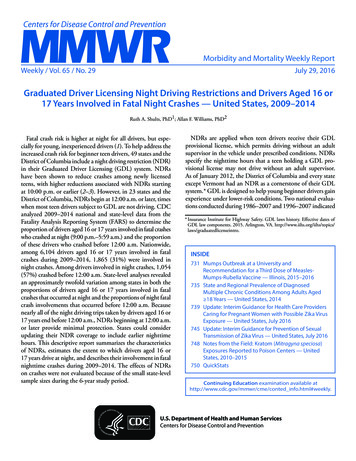
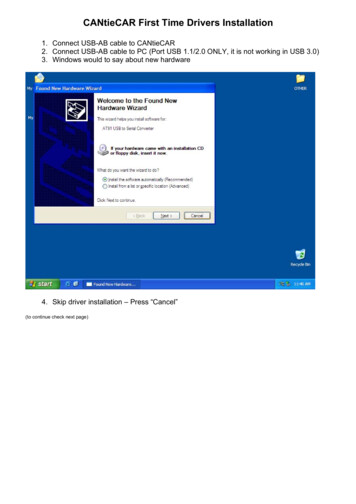


![Change Management Process For [Project Name] - West Virginia](/img/32/change-20management-20process-2003-2022-202012.jpg)
